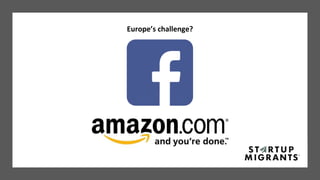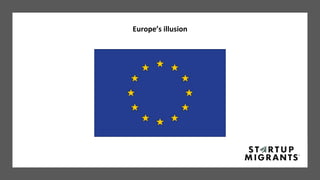Keynote: The State of the European Tech Industry at ArabNet Digital Summit 2018
- 1. A book mapping the innovation output of migration in Europe.
- 2. Europe – the most innovative place in the world in 1762
- 3. - Barclays Bank (1736) University of Oxford - France (1789) ETH - Nokia (1865) - Ericsson (1876) - RWE (1898) - Lufthansa (1926) - Estonian State (1991) - The Startup-scene in Europe is often corporate driven Heritage still matters
- 5. - Q4 of 2017, U.K. startups accounted for almost half of the $4.27 billion raised European startups. 7.5 2.8 1.3 2.5 19.4 3.7 2.1 1.2 2.9 14.6 4.5 3.2 1 1.6 13.8 1.4 0.623 0.223 0.54 4.2 4.5 1.8 0.696 1.4 4.5 UK GERMANY SW EDEN FRANCE EUROPE 2017 2016 2015 2012 Main city 2017
- 6. - London: The most global ecosystem, best access to capital, talent and good taxation. Strong in fintech. - Berlin: Highest number of industrial incubators, attracts talent, strong in Blockchain. - Stockholm: Highest number of unicorns per capita and strong in B to C. - Heritage matters: Sweden is strong in B to C with HM, IKEA, Ericsson and ABBA. - Q4 of 2017, U.K. startups accounted for almost half of the $4.27 billion raised European startups. - According to Start-up Heat Map 85 percent of founders were against Brexit – but still London gains attraction in comparison to other cities. The strengths of the established ecosystems
- 7. - 21 percent of Europeans entrepreneurs are migrants. (36 percent non-EU) - 54 percent of entrepreneurs in London and 43 percent in Berlin are foreign born. - In the UK 9 of 10 companies worth more than $1 billion have a migrant in the founding team. - In the UK migrants are three times as likely as native born to start a business. - Opposed to UK and US – migrants find it harder to scale in Europe. Migrants starting business – exceeding a national precedent.
- 8. A small European laboratory
- 9. In 2016 the most active venture investor was the French government
- 11. 321 78 5.6 4 129 91 14.9 3.7 291 72.5 50.2 21.5 95 2.7 0.459 0.6 AMSTERDAM OSLO TALLIN LISBON 2017 2016 2015 2012
- 12. - Lisbon: Sexy former P in PIGS with strong public investment and low cost of living. - Amsterdam: Liberal city becomes a test bed for the EU with VR and AI. - Oslo: The oil area is coming to an end leading to public investment and inexpensive talent. - The first hubs had strong corporate backing. - Up coming hubs are based on public private partnerships - Up coming hubs tend to have trouble scaling and loose companies to the UK and US. The strengths of the up-coming ecosystems
- 15. - We are moving from consumer internet to the industrial internet. - Europe has a strong industrial base which is investing in deep tech - Europe has world leading SMBs and European scaleups are predominantly B2B (55%). - Europe can scale out – and 41 Unicorns since 2003. Heritage, “mittelstand” and corporates
- 16. 40 32 72 UNI - CS AI CORPORATES INVESTMENTS Slush - Atomico "State of European Tech" 2017
- 17. A book mapping the innovation output of migration in Europe.

















